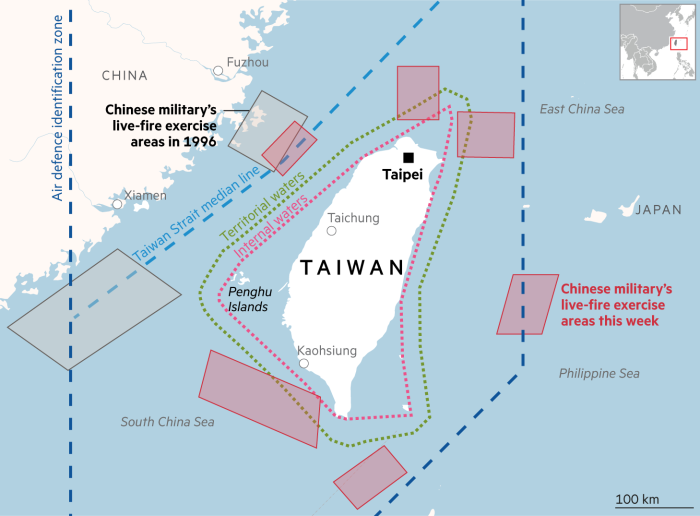[ad_1]
China’s missile launches into Taiwan’s coastal waters this week have underlined the risks to global supply chains from any sustained escalation of tensions between the feuding countries.
The military exercises in response to a visit by US House Speaker Nancy Pelosi to Taiwan resembled a rehearsal for a blockade of the export-dependent island, with some cargo ships forced to adjust course and airlines cancelling flights.
Three of the six areas blocked off for the exercises are in or near the Taiwan Strait — the body of water between the island and Chinese mainland that is only 130km wide at its narrowest point. The Strait is the primary shipping route between China and Japan, the world’s second- and third-biggest economies, respectively, and Europe. It also serves as a trading route for technology powerhouse South Korea, carrying manufactured goods from the factories of Asia to many of the world’s consumers.
“In an environment where China tries to take a more assertive role and tries to block the Strait . . . it’ll be hugely disruptive,” said Anoop Singh, principal analyst at shipbroker Braemar. “Everything will get impacted.”
China’s military drills in the Strait and the East China Sea this week — which are significantly broader in scope than war games staged during the last such crisis in 1995 and 1996 — were only scheduled to last a few days. But analysts said the manoeuvres could initiate a sustained period of heightened tensions across the Strait.
Beijing claims Pelosi’s visit, the first by a Speaker to Taiwan in 25 years, is part of a “hollowing out” of Washington’s “one China” policy, under which America recognises Beijing as the sole government of China and acknowledges, but does not accept, its claim to the island.
“Prolonged or regular drills in the Taiwan Strait could create significant disruptions in Taiwan’s trade with the rest of the world, and in global supply chains,” Homin Lee, Asia macro strategist at Lombard Odier, wrote in a note.
Half of the global container fleet and 88 per cent of the world’s largest ships by tonnage passed through the Strait this year, according to Bloomberg data.

While live fire exercises are “an extremely common event at sea”, they are usually restricted to less heavily trafficked areas, Braemar’s Singh said. He added that 1mn barrels of crude oil and oil products normally pass through the Strait per day. “This water is typically very, very congested.”
Singh said he knew of at least two big ship owners that had asked vessels to avoid the Strait following reports of live fire in the area.
“Most others are likely to follow [their] lead,” he added.
Elsewhere in Asia-Pacific, Japanese shipping group NYK Line issued a warning to avoid the Strait, while South Korean carrier Korean Airlines cancelled all flights between Seoul and Taipei on Thursday and Friday. Korean media also reported that Asiana Airlines cancelled its flights between Seoul and Taipei, while Hong Kong’s Cathay Pacific said it was “monitoring the developments very closely”.
Any prolonged attempt to impede international commerce from Taiwan, with several of the main military exercises occurring near two of the island’s main ports, would hurt global trade.
Taiwan is a crucial link in global technology supply chains. Taiwan Semiconductor Manufacturing Co accounts for 90 per cent of the world’s cutting-edge chip capacity, while downstream electronic contract manufacturers such as Apple supplier Foxconn produce components and assemble products from smartphones to servers for some of the world’s biggest companies.
Further cross-Strait fallout could be devastating for Taiwan’s economy, with 40 per cent of its exports going to China and Hong Kong, according to figures from Capital Economics. China has already announced the suspension of thousands of agricultural imports from the island.
“In the event of a disaster that actually shut down Taiwan for a period of time, really I don’t know how the global supply chain for the tech industry could survive,” said Dan Nystedt, vice-president at TriOrient Investments.
“You’ve got at least $3tn to $4tn worth of work that’s not going to get done, potentially.”
Paul Tsui, managing director of Hong Kong-based logistics services firm Janel Group, which serves companies such as General Electric, said some clients had raised concerns about disruptions to business from Pelosi’s visit to Taiwan.
“If tensions in the Taiwan Strait do escalate, cost and transit times would hike significantly [and] could be even worse than Covid disruptions,” said Tsui.
Additional reporting by Kathrin Hille in Taipei, Song Jung-a in Seoul, Eri Sugiura in Tokyo and Maiqi Ding in Beijing
[ad_2]
Source link
